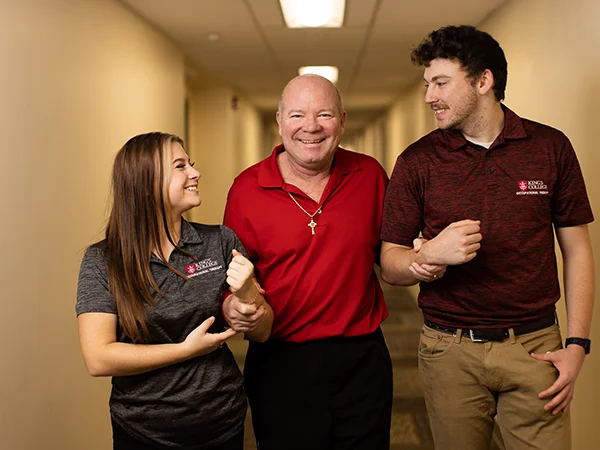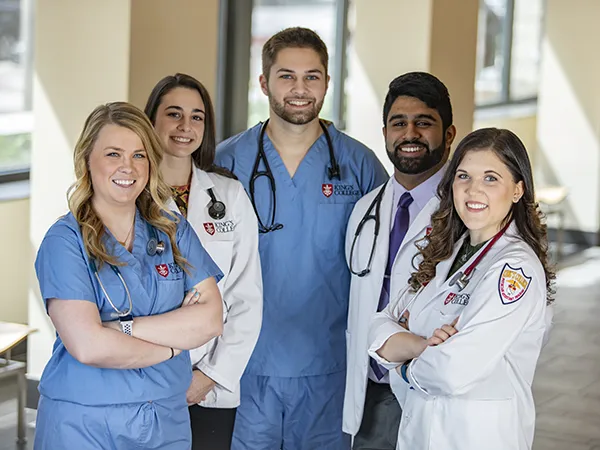Occupational Therapy

Program Overview
King's College is pleased to announce its first upcoming doctoral program, awarding students a Doctorate in Occupational Therapy (OTD) with a Specialization in Leadership upon completion. The 3+3 BS/OTD program requires six years of academic studies, including six months of clinical fieldwork and a 14-week doctoral capstone experience. This accelerated degree program leads to an entry-level Clinical Doctorate after graduating with a Bachelor of Science in Exercise Science with a Minor in Neuroscience and Psychology from King’s College. The Post-Baccalaureate entry into the OTD program (OTD only) requires three years of academic studies, including 6 months of clinical fieldwork and a 14-week doctoral capstone leading to a Clinical Doctorate with a Specialization in Leadership.

Occupational Therapy helps people across the lifespan engage in healthy practices and participate in the things they want and need to do in everyday life despite injury, illness, or disability.
Accreditation

Mission
Aligned with the mission of King’s College, the Occupational Therapy Department aspires to develop highly competent, innovative, reflective, and ethical practitioners who effectively and efficiently translate knowledge to practice utilizing evidence, critical inquiry, clinical reasoning, and leadership in everyday OT practice to serve the occupational needs of a diverse and dynamic world.
Vision
The vision of the Occupational Therapy Department at King’s College is to engage meaningful interactions between students and faculty to facilitate an active community of learning that meets the dynamic and diverse nature of people, groups, and populations to promote health, well-being, and quality of life through participation in meaningful occupations. We meet this vision by:
- Developing and maintaining a comprehensive, diverse, responsive, and integrative didactic and clinical curriculum that develops depth and breadth of knowledge that prepares students to successfully pass the NBCOT exam and become competent health care providers and leaders within the profession.
- Emphasizing experiential learning, evidence-based practice, clinical reasoning, critical inquiry, interprofessional collaboration, and reflective practice to develop practitioners who promote health, well-being, and quality of life through participation in meaningful occupations.
- Cultivating professional integrity by emphasizing legal, moral, ethical, and professional principles and behaviors to develop practitioners who respect all clients diverse socio-cultural, ethnic, and religious differences.
Why Choose a King’s OTD
- A dynamic, innovative hands-on interactive teaching philosophy built on transformational learning.
- Emphasis on Neuroscience and Human Cadaver Anatomy that provides a solid foundation for clinical excellence
- A leadership and mentoring program that brings together top clinicians, leaders, and businesses in the field to mentor our students throughout the OTD program
- Fieldwork and Capstone placements that allow students to create, implement and reflect on skills and interventions needed to provide OT services in traditional and non-traditional placements
- Faculty who are experts in their field but also relatable, personable, and value guiding students through the evolution into the best practitioner and global citizen they can be
- Our core values (Themes) of Responsive Occupation-Based Interventions, Excellence through Innovation, Clinical Curiosity and Reasoning, and finally, Leadership, Advocacy, and Scholarship in Everyday Practice
- The curricular focus (Threads) on Social Justice, Interprofessional and Community Collaboration, Reflective Practice, and the Dynamic and Diverse Nature of Occupations Across the Lifespan
- Additional specializations in Social Justice, Innovation, Neurodiversity, or Trauma Informed Care that can be attained through graduate electives
Additional Info
Admission and Progression Criteria
Program Philosophy
The Department of Occupational Therapy philosophy interweaves the philosophical base of occupational therapy with the mission of King's College. Human beings learn and live through engagement in meaningful occupations that evolve across the lifespan and are essential for health, well-being, and quality of life. We believe that all humans need meaningful occupations to thrive. We understand that the human experience is complex and unique and that there are many dynamic systems and contexts at work, creating the need for occupational therapists to understand this transactional and transformational process. Health, well-being, and quality of life are the desired outcomes of these meaningful experiences for the clients we serve and for all of humanity. The right to access meaningful occupation is a form of social justice for which we believe our students need to advocate regardless of ability, gender identity, age, race, ethnicity, socioeconomic status, sexual orientation, or cultural background. Our program considers these factors with the curriculum design that encourages active learning, collaborative processes, and critical inquiry, focusing on meaningful occupations. Education is not the bestowing of knowledge upon a student but rather a culmination of meaningful experiences, active self-reflection, purposeful self-directed pursuit of knowledge, increased self-awareness, and growth as an active learner in the educational process. Transformative learning theory is utilized as the base pedagogy throughout the curriculum design to guide our students to learn to adjust their thinking based on new information acquired while integrating past knowledge via reflective practice. This educational philosophy combines constructivism and critical pedagogy in an active learning environment. Learning takes place through doing; therefore, coursework and fieldwork experiences are created to provide students with strategic opportunities to employ these skills in practice and scholarship. While we need to prepare our students for entry-level practice, we believe in challenging our OT students not just to meet the expectation but to exceed it for themselves and the profession. We do this by creating a passion for lifelong learning, evidence-based practice, the use of true occupation, and community leadership, mentorship, and advocacy.
Our profession and our institution understand the dynamic interaction between the individual, their occupation, and the environment and that occupational therapists work in the best interests of their clients when working collaboratively to enhance engagement and performance in the pursuit of health, well-being, and quality of life. These collaborations and connections are fostered in our program through local, national, and international education, activities, and occupations that enhance the understanding of cultural and global dynamics.
The King's College and OT Department missions state that we develop highly competent, innovative, reflective, and ethical practitioners who effectively and efficiently translate knowledge to practice utilizing evidence, critical inquiry, clinical reasoning, and leadership in everyday OT practice to serve the occupational needs of a diverse and dynamic world. Our philosophy of education emphasizes active learning and participation, application of theory, knowledge, and skills, community leadership, passion for lifelong learning, and evidence-based practice within a dynamic, creative, and hands-on learning curriculum. We foster a learning community where students, faculty, and clients learn from each other, focusing on foundational themes and threads that guide our curriculum design. This is reflected in the value of our mission at King's College where, "King’s teaches its students not only how to make a living, but how to live.”
Curriculum Design
Curriculum design is a complex integration of several dynamic systems similar to the human experience. The curriculum is designed to reflect the mission and vision of both King’s College and the Occupational Therapy Department, integrating the professional philosophy and values within the didactic and clinical components of learning. Highlighting the essential parts of a core undergraduate education that builds individual knowledge is followed by courses that provide foundational concepts of the OT professional, culminating in the active, engaged, self-reflective, learned experiences that create ethical, occupation-focused evidence-based practitioners. Within the OT curriculum, students learn to think critically and holistically, employ the experiences from their undergraduate core foundation, to analyze occupation and the individual occupational experience, create meaningful creative and unique interventions for persons, groups, and populations, all while utilizing leadership, advocacy, evidence-based practice, and ethics.
Through experiences and active learning embedded throughout the OT program, its students and faculty will:
- Implement occupation-focused occupational therapy interventions that are culturally relevant, evidence-based, reflective of current occupational therapy practice, and supported with appropriate theoretical perspectives for individuals, groups, and populations.
- Apply critical thinking and clinical reasoning skills to identify and analyze problems, formulate and implement solutions, and assess and reflect on outcomes.
- Collaborate skillfully with clients, including individuals, groups, and populations, to evaluate via the Occupational Therapy Practice Framework (OTPF) to develop individualized goals for occupational performance and implement interventions to achieve desired outcomes.
- Demonstrate how to effectively communicate, educate, and advocate via written, oral, and nonverbal means with and for clients, family members, significant others, interdisciplinary colleagues, administrators, and the community at large.
- Analyze the relevance of current socio-political, legal, economic, national, international, demographic, and health disparity issues and trends to create, plan, and implement occupation-based programs that address contemporary and global issues affecting health, well-being, and quality of life.
- Evaluate collaborative interprofessional practice to improve service delivery within complex systems and organizations.
- Integrate innovative, technological, creative, and educational resources into program planning, design, management, and intervention.
- Reflect and integrate their liberal arts background, science, and technology, including its relationship to society, impact on the environment, performance, and occupations to demonstrate the capacity and commitment to lifelong learning.
The occupational therapy curriculum is designed to reflect the values and mission of the OT profession and King’s College. Students enter the program and participate in a foundational and professional sequence of coursework that follows a dynamic, intentional, and integrated series of learning experiences that prepare them to become entry-level occupational therapists.
Themes and Threads for the Program
Four themes and four threads provide a structure to our curriculum design. Responsive Occupation-Based Interventions; Excellence through Innovation; Leadership, Advocacy, and Scholarship in Everyday Practice; and Curiosity and Reasoning were developed with consideration for the mission and vision of King’s College and the OT Program as well as the profession at large. These themes emphasize the values of the faculty, the institution, and the OT profession, providing structure, intentionality, progression, and assessment to understand individuals, groups, and populations.
The four threads are highlights or a focus of the program and include the following: Occupational Justice; Interprofessional and Community Collaboration; Reflective Practice; and Dynamic and Diverse Nature of Human Occupation Across the Lifespan. Themes and threads are interwoven throughout the curriculum design; however, not all themes and threads are addressed in every course.
Themes
These four themes are the core values of the OT program and its faculty and are woven throughout the curriculum.
Responsive Occupation-Based Interventions
As the core of our profession, occupation is interwoven and highlighted during every course throughout the entirety of the OT Program. Engagement and participation in meaningful occupations are fundamental concepts for interacting with the world around us and are essential to human health and well-being, and quality of life. The occupational therapist’s ability to understand and, more importantly, respond to the need for engagement in occupation is critical and will be expected as a graduate of our program.
Excellence through Innovation
Innovation is a skill that needs to be fostered and guided in a way that allows for creativity, risk-taking, and divergent thinking within a culture of effective learning and leadership. Embracing innovation provides for the potential for excellence, both clinically and professionally. These concepts will be consistently nurtured, valued, and encouraged throughout the curriculum to create an environment that breeds clinical and professional excellence through innovation.
Leadership, Advocacy, and Scholarship in Everyday Practice
These skills are needed to make progress and maintain relevance for the OT profession at large. Barriers are often the belief that students or practitioners may not have the skill, time, or resources to accomplish leadership, advocacy, and/or scholarship in their practice. Engraining these concepts early in the curriculum and emphasizing how to apply this to everyday practice and every day as a community and global citizen.
Curiosity and Reasoning
Clinical reasoning is the ability to respond efficiently, ethically, and effectively to any clinical situation and is developed with exposure, experience, and processing over time. Often, clinical inquiry is required to clinically reason to provide the best evidence-based approach to intervention and requires exposure, experience, and processing to develop. These skills are collaborative and complementary and therefore are entwined in many of the curriculum’s foundational and advanced level components. The goal is to develop habits of intellectual curiosity, life-long learning, innovation, and dissemination of knowledge.
Threads
The four threads below reflect the focus areas that are highlighted and interwoven throughout the curriculum.
Occupational Justice
This thread requires awareness, understanding, respecting, and responding to others’ diverse experiences, perceptions, values, and attitudes. Self-reflection and awareness of one’s understanding of these concepts are crucial to growth in this thread. We believe that all humans have the human right to engage in and access occupations they find meaning, value, and purpose in regardless of ability, gender identity, age, race, ethnicity, socioeconomic status, sexual orientation, or cultural background.
Student Learning Outcomes
- Analyze how conditions of DEI and occupational justice influence and are influenced by participation in occupation for individuals, groups, and populations
- Demonstrate awareness, knowledge, and competence in assessing, planning for, and engaging clients in meaningful occupation and its impact on occupational performance
Interprofessional and Community Collaboration
This thread will emphasize the power of collaboration for the common good of individuals, groups, and populations. It is in the best interests of our clients for us to engage in true interprofessional collaboration, which starts with the understanding of other disciplines and organizations, followed by action in the form of advocacy and implementation. Innovative programming with community partners furthers the distinct value of occupational therapy and assists in engaging needed and meaningful programs that serve the greater good. These types of collaboration are required to form excellence in occupation-based support and client-centered care.
Student Learning Outcomes:
- Evaluate potential applications of occupational therapy to areas of need, and address through education, advocacy, and programs
- Apply values and principles of professional conduct, communication, and collaboration to optimally meet societal, community, and individual needs
Reflective Practice
Understanding oneself as a professional through self-reflection, engagement in professional activities, and awareness and development of professional behaviors are critical components to forming a professional identity. True self-reflection comes with an active response to the need for change, adaptation, knowledge attainment, adjustment, and alteration of one’s professional formation of identity. These require a commitment to lifelong learning both personally and professionally. These concepts are crucial to clinical excellence and sustainability, and growth of the OT profession.
Student Learning Outcomes
- Evaluate personal and professional strengths and weaknesses and create action items to strengthen one’s professional identity that shows growth.
- Analyze clinical and scientific evidence to enact best practices to advance one’s professional identity and advance the science of occupation and its translation to therapeutic practice.
Dynamic and Diverse Nature of Occupations Across the Lifespan
Understanding the complexity and uniqueness of human occupation and the skills to facilitate occupational participation are two of the main tenets of the profession. Content addressed by this thread is built upon a core understanding of human anatomy, physiology, and neuroscience, areas of occupation, the human need for meaningful engagement, ethics, occupational justice, and is supported by the attitudes of inquiry, innovation, and collaboration. The process by which occupational therapists deliver client-centered occupational therapy services is guided by theories, conceptual models, therapeutic use of self, collaborative relationships, procedural knowledge, clinical reasoning, therapeutic interventions, and include competency in evaluation, intervention, and outcomes monitoring to engage clients in meaningful occupation.
Student Learning Outcomes
- Assess the value of and need for meaningful occupation across the life span as a predictor of health, well-being, and quality of life for individuals, groups, and populations
- Construct, monitor, and modify therapeutic interventions and programs that are occupation-centered, evidence-based, and formulated in collaboration with individuals, groups, or populations
P.P.O.T.D. Program
Our part-time, hybrid post professional doctorate in occupational therapy (PPOTD) program is for licensed occupational therapists that have a master’s degree and wish to obtain their doctoral degree.
In fact, only 2% of occupational therapy practitioners have a doctoral degree, which is why King’s College is addressing this nationwide shortage with a program that’s unmatched in value: earn your doctorate in less time through our innovative and dynamic format that prepares you for OT of the future, not just the past.
Program Format
Graduate students can choose between two unique tracks not offered at other institutions: Academia, Leadership, and Diversity (ALD) or Clinical Leadership, both consisting of 26 credits.
Full-time working professionals will appreciate our programs’ exclusively online and hybrid formats with mostly asynchronous online learning and minimal time required on campus. Students seeking more in-person or synchronous interaction can augment their study as needed. Plus, no residency is required, making the PPOTD program convenient for maintaining full-time work alongside study.
Visit our Graduate Tuition rates page for current costs per credit.
The PPOTD flatsheet is available as a PDF here.
Academic, Leadership, and Diversity Track
The Academia, Leadership, and Diversity (ALD) track is for OT’s who plan to teach at some point in their career or enjoy being leaders in the field regarding diversity, equity, and inclusion, among other areas important to the future of the profession. The curriculum is structured over 15 months and 5 semesters and can be completed entirely online.
Clinical Leadership Track
The Clinical Leadership track is for current clinicians who want to become leaders in a specific area of practice or simply hone their clinical and leadership skills. The curriculum is structured over 15-18 months and 5-6 semesters. Most of this track can be completed online but does include two to three advanced practice electives taught on campus over a weekend. Alternative formats may be available, as needed.
Program Requirements
All program applicants meet the following requirements:
- Hold a master’s degree from an accredited institution
- Show proof of valid state Occupational Therapy license